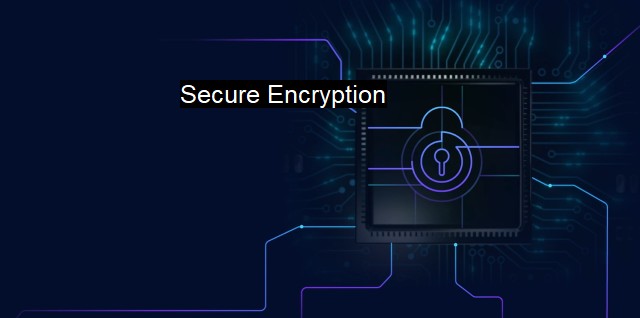What is Secure Encryption?
The Importance of Secure Encryption in the Digital World: Protecting Data and Communication from Cyber Threats and Attacks.
Secure encryption refers to the process of converting information or data into a code to prevent unauthorized access. This forms an integral part of cybersecurity, as it serves as the primary defense line against hacking, data theft, and unauthorized intrusion. Encryption has become an increasingly crucial part of daily activities, as we are continuously engaging within various digital spaces, be it through internet banking, online shopping, or communication.In an era of increasing digitalization of information, cybersecurity is indispensable and encryption forms its backbone. Through secure encryption, sensitive data is made unreadable to anyone without the proper decryption key. For this reason, secured encryption works closely with effective key management. Key management ensures that the encryption keys are generated, exchanged, stored, used, and replaced in a secure manner.
There are two primary types of encryption algorithms; public key (asymmetric) encryption and private key (symmetric) encryption. Symmetric algorithms use the same key to both encrypt and decrypt information, while asymmetric algorithms utilize a pair of keys: one for encryption and another for decryption. This public key infrastructure is essential particularly in secure eCommerce and online transactions involving credit card information and personally identifiable information.
Encryption not only safeguards information at rest in databases and storage, but it also protects data in transit over network connections, allowing information to travel securely across various locations. All digital data including texts, emails, documents, and pictures, when encrypted, is less susceptible to breach. As a result, cyber threats, phishing, identity theft, and other fraudulent activities are significantly mitigated.
When we bring antivirus into discussion, encryption has a significant part in securing systems from threats. Modern antiviruses incorporate encryption capabilities. These programs not only eradicate threats from a system, but they also encrypt files, securing data and reducing potential damage from threats.
Conversely, threat actors can also misuse encryption. Because encrypted data cannot be read by security technology, malware concealed with encryption can often slip by unnoticed. By using encryption, cybercriminals can evade antivirus detection, smuggle data without triggering alarms, and even unveil their next move in slow motion, which is challenging to detect. Thus, antivirus machines are now being equipped with the ability to decrypt and inspect data on the fly, sensing threats that were previously undetectable.
As our daily activities increasingly shift to digital platforms, and the volume of sensitive data stored and transmitted online continues to grow, the importance of secure encryption cannot be underplayed. Secure encryption goes far beyond hiding information from unauthorized individuals—It is the gatekeeper of digital trust. As such, understanding the extent and gravity of its role in cybersecurity is crucial to build and nurture the trust that permits the digital world to function seamlessly. Meanwhile, concurrently with encryption evolution, antivirus machines and software need to be sophisticated enough to decrypt malicious algorithms and sense irregularities efficiently and on the spot. Encryption, therefore, plays a two-sided role, serving both as an elixir and adversary, and hence continues to form the cybersecurity conundrum.

Secure Encryption FAQs
What is secure encryption?
Secure encryption is a process of converting plaintext into ciphertext using a cryptographic algorithm or key. It ensures that data can only be read by authorized parties who have the correct key to decrypt the data.Why is secure encryption important in cybersecurity?
Secure encryption is crucial in cybersecurity because it protects sensitive data from being intercepted and read by unauthorized parties. This is especially important when transmitting data over the internet or storing data on a network or device. Without encryption, data could be compromised, leading to serious security breaches and cyber attacks.What makes a good encryption algorithm?
A good encryption algorithm should be secure, meaning it should be nearly impossible to crack the code without the correct key. It should also be efficient, meaning that it can handle large amounts of data quickly and with minimal impact on system performance. Additionally, a good encryption algorithm should be scalable, so it can be used on different platforms and devices.How can I ensure that my data is encrypted securely?
You can ensure that your data is encrypted securely by using reputable antivirus or cybersecurity software that includes encryption features. You should also choose strong passwords and use two-factor authentication whenever possible. Finally, make sure to keep your software up-to-date and avoid sharing sensitive information over unsecured networks.| | A | | | B | | | C | | | D | | | E | | | F | | | G | | | H | | | I | | | J | | | K | | | L | | | M | |
| | N | | | O | | | P | | | Q | | | R | | | S | | | T | | | U | | | V | | | W | | | X | | | Y | | | Z | |
| | 1 | | | 2 | | | 3 | | | 4 | | | 7 | | | 8 | | |||||||